The hierophant was the chief priest of the cult of Demeter and the only mortal who had the right to enter the Anaktoron. His appointment was for life, but only members of the family of Eumolpidae were eligible for the office. The only exception (and a very sad one at that) was the last hierophant, whose election violated almost all the restrictions and rules surrounding the office for centuries. The hierophant displayed the holy things to the initiates at the culmination of the celebration of the Greater Mysteries. His office, therefore, was entrusted with revealing to the faithful the fundamental content of Demeter’s cult. He also took the role of Hades and Zeus during the sacred performance of Persephone’s story in the Telesterion.
The hierophant proclaimed the sacred truce in the middle of the month Metageitnion and dispatched the spondophoroi to the far corners of the Greek world to invite cities to send the first fruits (aparche) for the goddess and the faithful to gather in Eleusis for the celebration of the Greater Mysteries. The hierophant interpreted the ancestral laws that governed the organisation and observance of the Mysteries. Together with the daduch he announced the Mysteries (prorrhesis) from the Stoa Poikile on the 15th day of Boedromion. He administered the sanctuary of Demeter and Kore and was responsible for adjudicating cases related to breaches of regulations or the sanctity of the celebration. Sometimes, of course, he found himself in the awkward position of the accused, as happened with the hierophant Archias, who offered a sacrifice illegally on the wrong day in the company of a courtesan called Sinope and despite the fact that it wasn’t his right to perform the sacrifice (this being the responsibility of the Priestess of Demeter).
The hierophant had the general supervision for maintaining order and the rule of law in the city of Eleusis. The Greater Mysteries were primarily a majestic religious event, but they also had practical dimensions. There was a need to feed and accommodate thousands of initiates and visitors who gathered in the city during the celebration. Along with the magistrates and a party of slaves in charge of supervising the weights and measures, he monitored the market to prevent abuses by greedy merchants that would discredit the festival and the city.
The office of the hierophant enjoyed great prestige in Athens. He received honours commensurate with those of the highest magistrates and higher than those of the priests of the traditional deities of Athens. The hierophant’s name appeared first on the aeisitoi list (i.e. men fed in the Prytaneion at public expense). He sat in a marble seat of the first row of the proedria in the theatre of Dionysus, close to the throne of the priest of Dionysus Eleuthereus. He had the right to set up a statue of himself at Eleusis and to refuse initiation to anyone he considered unworthy.
Among the crowds gathered to celebrate the Mysteries, the hierophant stood out with his impressive, archaic clothes, especially the chiton and the purple ceremonial garment adorned with golden stars that he wore during the celebration of the Greater Mysteries.

Pyre B. Panel of Euphiletos, Konstantina Kokkou-Vyridi, photograph, Εν Αθήναις Αρχαιολογική Εταιρεία © Η εν Αθήναις Αρχαιολογική Εταιρεία
The hierophant was permitted to marry but he had to abstain from carnal pleasures during the celebration of the Mysteries. To that end, he consumed certain substances that suppressed the libido to ensure the required restraint and purity. He was also strictly prohibited from holding any other offices. In return for these sacrifices, the hierophant enjoyed the privilege of hieronymy (the replacement of their name with the title of their priesthood), so his name took the form “Hierophant, Patronymic, Demotic'' (e.g. Ιεροφάντης Ευστρόφου Πειραιεύς or Ιεροφάντης Μενεκλείδου Κυδαθηναιεύς). In some cases, we encounter the word Ποσειδώνιος instead of the title, since Eumolpus, the legendary ancestor of the Eumolpidae, was supposedly the son of Poseidon.





